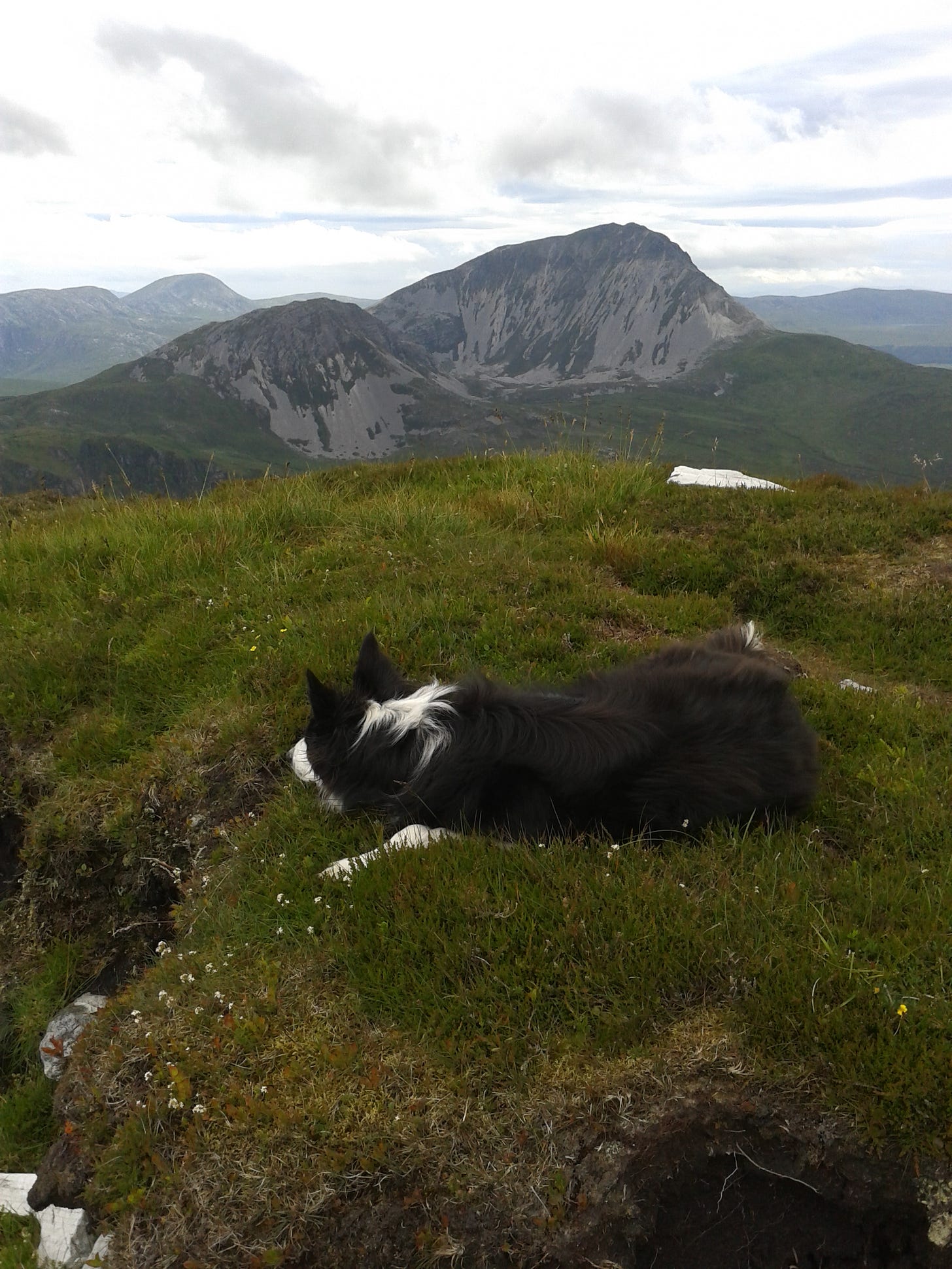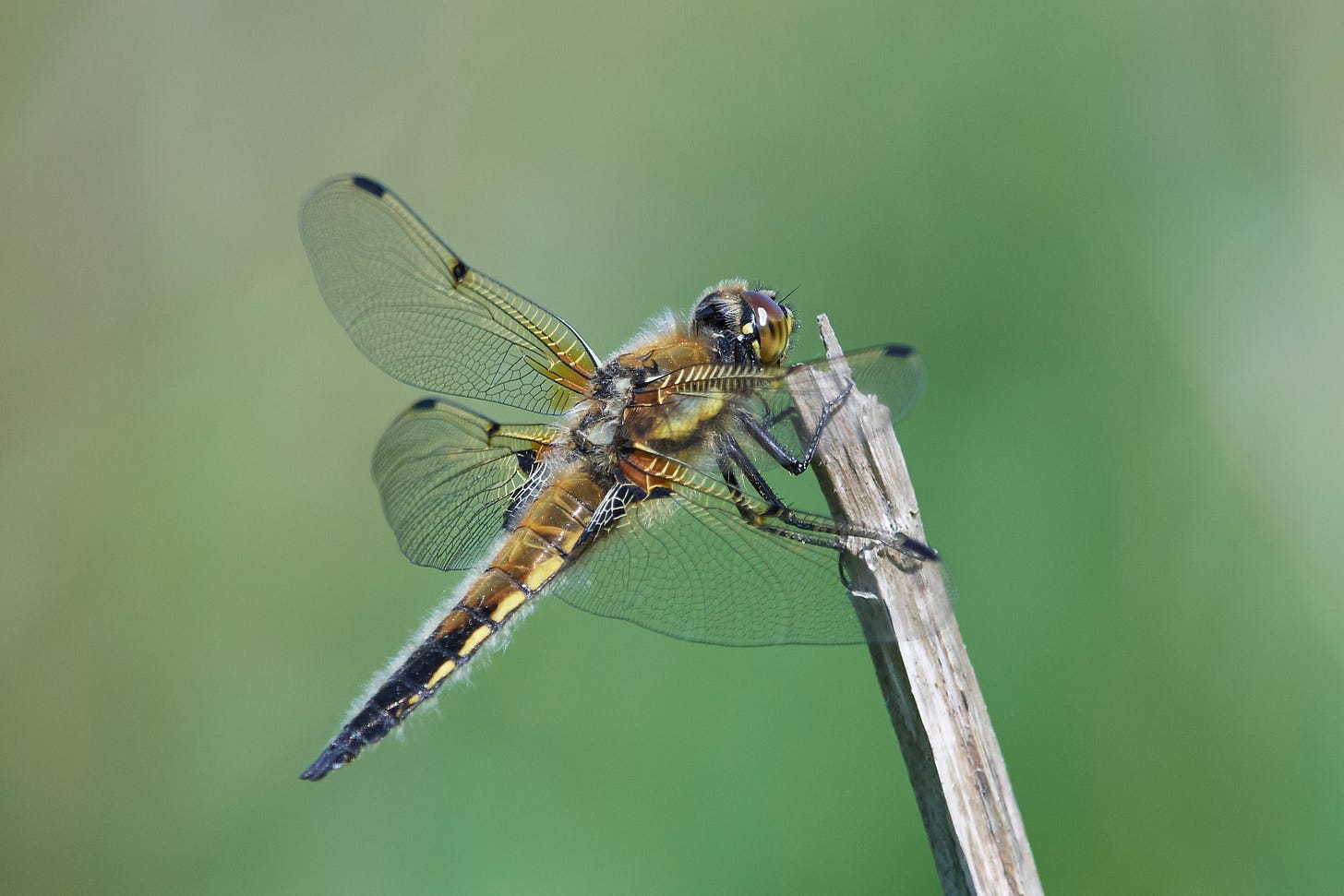‘Riverwitch’ is a collaborative project with my wife Sharon Blackie, writing on her Substack The Art of Enchantment. It’s the re-understanding of a prose duet we wrote for each other back in 2014, both grieving and celebrating our dislocation from the Isle of Lewis in the Outer Hebrides to Donegal in north-west Ireland. It offers a story-within-a-story as, ten years on, we try to make sense of the ways in which places claim us, mark us – and then, when it’s time, cast us loose. We are taking turns every Wednesday to revisit one of the original posts and add new reflections and insights. The series will be complete before the end of the year.
The previous post in this series was Sharon’s ‘Falling into the story’, which she posted last week. Read it here. You can also find more of the background to this project here.
September 2014
Can I sell you eternity? Oh, go on. Once we have had enough food and love, what have we always wanted if not a slice of forever? Why else did we abandon the modest gods of the woodland and the river for those mighty monoliths who have maddened us so? They offered us eternity and we were unable to resist.
Since I arrived here in Ireland a few months ago I have been trying to subvert the monopoly on eternity which Big-Deity has carved out for itself. I’ve been prospecting in the Derryveagh mountains of Donegal. Up to my knees in flowing legend. Panning for the fool’s gold of immortality. If not here, then where on earth?
I found the glitter alright. But it wasn’t up there where you might expect, in the fast-flowing deep-cut runnels where the sweat streams off the harrowed brows of the mythmaker peaks, slaving away at the cauldrons of their latest stories. It was down here in the valley all along. On the table-top bog which keeps its counsel and bides its time, just across the river from our house. A place so flat and so featureless that it is hard to resist putting a spirit level to it. Just to check. Four or five hundred yards on the square. Not bog as far as the eye can see. Nothing so grandiose. Just a humble bit of a bog, not wanting to bother the cartographers. Nonetheless, try walking the same steps across it two days in a row and you will fail. Line up distant marks and they will drift out of alignment. Even if you leave yourself clues, little scraps of tatter-coloured rag. They will never be seen again. This empire of bog has clearly visible edges. But once you step within those boundaries, it becomes as wide as the restless ocean of your mind. This is rural Donegal, after all. There are few enough road signs and none which warn you that you are approaching the Otherworld.
In the dry time of September the bog crackles and frets under your feet. Twigs of heather thirst, moss bleaches. Except here at this summer-wet upwell, in a somewhere nowhere part of the bog, maybe a bit east of centre. Hard to be sure. I couldn’t point to it from a vantage point. I can find it only some mornings and that by walking a spiral of the bog’s own devising. If I try too hard it simply doesn’t appear, this old wound in the peat where clear water bleeds up to the sunlight and tarries just long enough. Neither a stream nor a pond, this channel is barely two foot across and the current hardly whispers its slow obeisance. After a sunlit thirty paces it lapses once more into the darkness. The surface water column is here and there a foot deep, mostly just a few inches. Below that, who knows. Black silt and the treasure house of organic decay.
So, after all that trekking and voyaging, those many expeditions and immrama, it transpires that the arbiters of eternity live neither in a cave high in the mountains nor on a fabled western archipelago. They live here, at the bog’s secret stash of soft water, their wings catching the sun as they have done for more than three hundred and fifty million years. Dragonflies. Four-spotted Chasers, with wide golden bodies and a pedigree to match. They once ruled the world. They may well do so again.
Over this wet wound in the skin of the peat, two pairs hold territories. Against each other and against reiving outsiders. Gradually, the manners and the motion of the individual creatures become familiar to me. The characteristic stop-turn one of them makes over a fragment of quartz. The way another tickles and teases the water with downdraught at its favourite, nameless shallows.
When they strike their prey it is too fast for my human eye. The moment that they alight, the image on my retina disassembles and I am left with nothing but empty insouciant heather, nonchalant sedge grass. But just for an instant, if I can only convince my ever-vigilant attention to please take a break, I sometimes find that the whole intricate calligraphy of the flight of a dragonfly remains briefly accessible, haunting the optic nerve.
To be with dragonflies in the warming morning sun is to submit. To abandon ambition as hopeless, to abandon hope as superfluous. To think again.
How had I got it so wrong? I had thought that the mountains were the anchor chains of time, holding the great ship steady in the storm. I had imagined that these frangible flying jewels were an improbable flicker of transience when set against the permanence of rock. But they have watched the mountains rise and fall. A dozen times over. To them a mountain is a puff of smoke on the long timeline’s horizon, soon enough dispersed.
In the creation myth of dragonflies they believe that they were given the most miraculous eyes, superior to those of any other living creature, on one condition: that they maintain a record of creation. It is their duty to keep the archives of all the multitudinous forms of life they see, above ground and below the water’s surface. They take their responsibilities very seriously. The original handwritten lists became an intricate filing system, which was transferred into a spreadsheet, which was converted to a database.
The original Devonian dragonfly databases had to be broadened to include dinosaurs, then refined to encode the first examples of feathered flight. Much later, somewhat reluctantly, given the slim chance of their persistence, they included the warm-blooded furry innovations which cowered in the cold. There have been so many entries, plausible additions at the time, which have subsequently needed to be archived. They do not rush to add another newcomer species, only to have its candle gutter and expire at some evolutionary dead end.
Thus the golden dragonflies decided it was best to ignore me. They flew around my bulk with distaste, the hum of their wings fractious, irritable. Their senses told them I was full of destruction and greed. They formed the opinion that this gawky, nearly hairless biped would not last the course. No need to add me and my kind to the files and then have the trouble of removing us again at the next revision.
But fearing my own death and the death of my species and the death of the memory of my species, I insisted. I brought with me a forked stick and stuck it in the ground next to the water. Then for three consecutive mornings I showed myself to them. Across the channel from my ersatz altar, I stood, I bowed, I crouched and I kneeled. Whispering, ‘See me, great eyes of the world, see me.’
On the third morning, as the sun rose high behind my back, a pair of golden flames hovered and yawed over an anomalous branch sticking out of a bushless bog. They landed and conferred. One of them tilted her head to face me, paused briefly, and wrote some short preliminary footnote in the ledger of the world. Is this what the old scholars meant when they spoke of moments of grace? I think it might be.
We don’t have long. Show yourself to dragonflies. While you still have time.
November 2024
Hawkers, darters, skimmers and chasers. These are the everyday names of the four main types of dragonfly species, some thirty-six in all, which live on these magical islands off the northwest coast of Europe. Such names are the distillates garnered from centuries of familiarity and wonder. They demonstrate an understanding of the detail. And they all encapsulate motion, a specific pattern of flight, as the defining characteristic. I can’t think of any other names in the animal kingdom which do that. Swift, perhaps. Maybe there are others with which I am not yet acquainted. I hope so.
It seems, then, that the dragonflies have always cast their gentle spell on us. Is there anyone who does not catch their breath when one appears? So precise, so complete, so dropped into the world. Do they come to bring us eternity or to wean us off it? I cannot be sure.





You possess a magical pen that pours enchantments from its nib….
“They landed and conferred. One of them tilted her head to face me, paused briefly, and wrote some short preliminary footnote in the ledger of the world.”
My goodness, thank you for this sincere reexamination of the history-keepers; so much more light and ethereal than the tomes of stone.